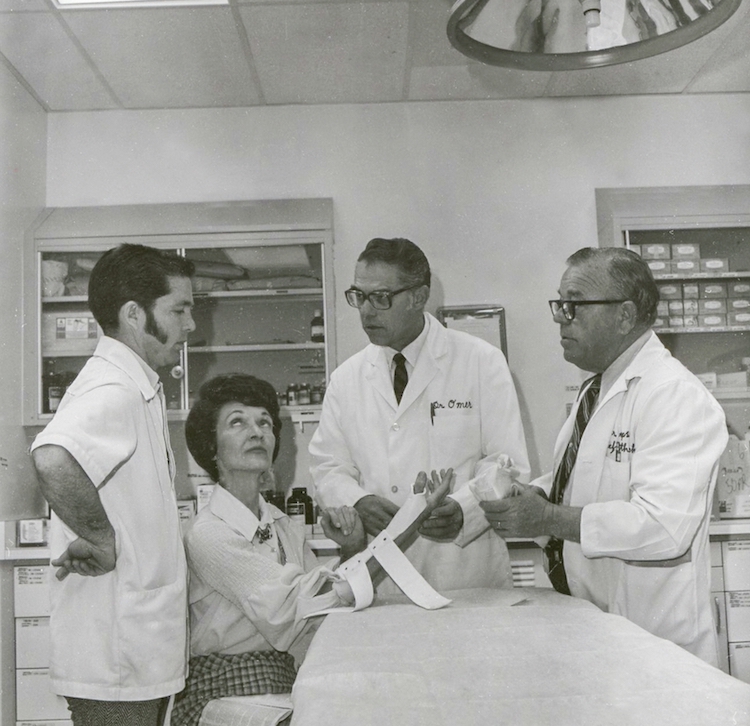The aspiration in forming the Council was to create a federal entity that would act as ethical and social regulator of the profession, whose advent resulted from the work of the Brazilian Association of Physical Therapists together with local associations and state leaderships.
Initially linked to the Ministry of Labor but now classified as public entities with special administrative autonomy, the Federal Council and its regional associations are responsible for issuing the professional identity card and supervising professional practice in the national territory established by Law No. 6.316, dated December 17, 1975.
The historical background
From 1951 to 1957, the Raphael de Barros Course, designed by Dr. Waldo Rolim de Moraes, aimed to form “Technicians in Physiotherapy”, at the Clinical Hospital of the University of São Paulo. This is considered the starting point of a policy for the implementation of Physical Therapy in Brazil. The first Brazilian physiotherapists graduated on February 27, 1958 at the School of Rehabilitation in Rio de Janeiro.
On December 10, 1963, Document No. 388/63 of the Federal Council of Education establishes the minimum curriculum and the duration of the courses of Physiotherapy and Occupational Therapy.
After the promulgation of Decree-Law No. 938 on October 13, 1969, the class leaders were mobilized to lobby the Ministry of Labor, the Chamber of Deputies and the Senate, to establish Federal and Regional Councils.
This was a difficult task because it would lead to the free exercise of the newly created professions. Consequently Decree-Law No. 938 was considered unconstitutional and the project was suspended.
Six years passed until 1975, when the Federal Council and the Regional Councils of Physical Therapy and Occupational Therapy were established under the administration of President Ernesto Geisel.
Even then, the first Board was founded on August 19, 1977 with the following Participants:
- President – Sônia Gusman
- Vice President – Veridiana Arb
- Secretary – Wladimiro Ribeiro de Oliveira
- Treasurer – Luciano Castelo Branco Rebouças.
The initial configuration of the Federal Autonomous System COFFITO / CREFITO contained three Regional Centers, with headquarters respectively in Recife CREFITO 1 Geraldo Barbosa – President, Rio de Janeiro CREFITO 2 Ruy Gallart – President and São Paulo CREFITO 3 Célia Cunha – President.The System currently has 16 Regional Representations.
COFFITO HEADQUARTERS: SRTVS quadra 701, conjunto L, Edifício Assis Chateaubriand, bloco II, salas 602/614. CEP 70.340-906 – Brasília – DF.
https://www.coffito.gov.br/nsite/
Read the text in Portuguese
A narrativa histórica
De 1951 a 1957, o Curso Raphael de Barros, projetado pelo Dr. Waldo Rolim de Moraes, com o objetivo de formar “Técnicos em Fisioterapia”, funcionou no Hospital das Clínicas da Universidade de São Paulo. Este é considerado o ponto de partida de uma política para a implementação da Fisioterapia no Brasil, mas ainda sem autonomia em relação ao exercício da profissão. Os primeiros fisioterapeutas do Brasil se formaram em 27 de fevereiro de 1958 pela Escola de Reabilitação do Rio de Janeiro.
Em 10 de dezembro de 1963, o Documento nº 388/63 do Conselho Federal de Educação estabelece o currículo mínimo e a duração dos cursos de Fisioterapia e Terapia Ocupacional.
Após a promulgação do Decreto-Lei nº 938, de 13 de outubro de 1969, garantidor da prática profissional de Fisioterapia e Terapia Ocupacional no Brasil, os líderes de classe foram mobilizados para sensibilizar as autoridades do Ministério do Trabalho, Câmara dos Deputados e Senado, para a criação dos Conselhos Federal e Regional.
Uma tarefa não muito fácil, devido à existência de um projeto naquelas casas legislativas, cuja aprovação, se ocorresse, levaria ao chão o livre exercício das profissões recém-criadas. Nesse episódio foi decisiva a participação de entidades de classe sediadas em Pernambuco, o que foi citado na opinião do Sr. Élcio Álvares, quando a Comissão de Constituição e Justiça da Câmara dos Deputados opinou pelo insulto e pela inconstitucionalidade do substituto ao Projeto Não. 2090 A / 70, que suspendeu os efeitos do Decreto-Lei nº 938.
Seis anos se passaram, quando em 1975, sob a administração do presidente Ernesto Geisel foi aprovada a Lei nº 6.316, criadora do Conselho Federal e dos Conselhos Regionais de Fisioterapia e Terapia Ocupacional. Esses seis anos foram muita atividade junto aos políticos, e a Associação dos Fisioterapeutas de Brasília – AFIBRA mais uma vez, devido à sua localização estratégica no Distrito Federal, tem papel de destaque.
Entretanto, somente em 19 de agosto de 1977, foi publicado no Diário Oficial da União o ato de nomear Conselheiros com os seguintes Participantes: Presidente – Sônia Gusman, Vice-Presidente – Veridiana Arb, Secretária – Wladimiro Ribeiro de Oliveira e Tesoureira – Luciano Castelo Branco Rebouças.
A configuração inicial do Sistema Autônomo Federal COFFITO / CREFITO continha três Centros Regionais, com sede respectivamente em Recife CREFITO 1 Geraldo Barbosa – Presidente, Rio de Janeiro CREFITO 2 Ruy Gallart – Presidente e São Paulo CREFITO 3 Célia Cunha – Presidente. Atualmente, o Sistema possui 16 Representações Regionais.
Acesse o link

